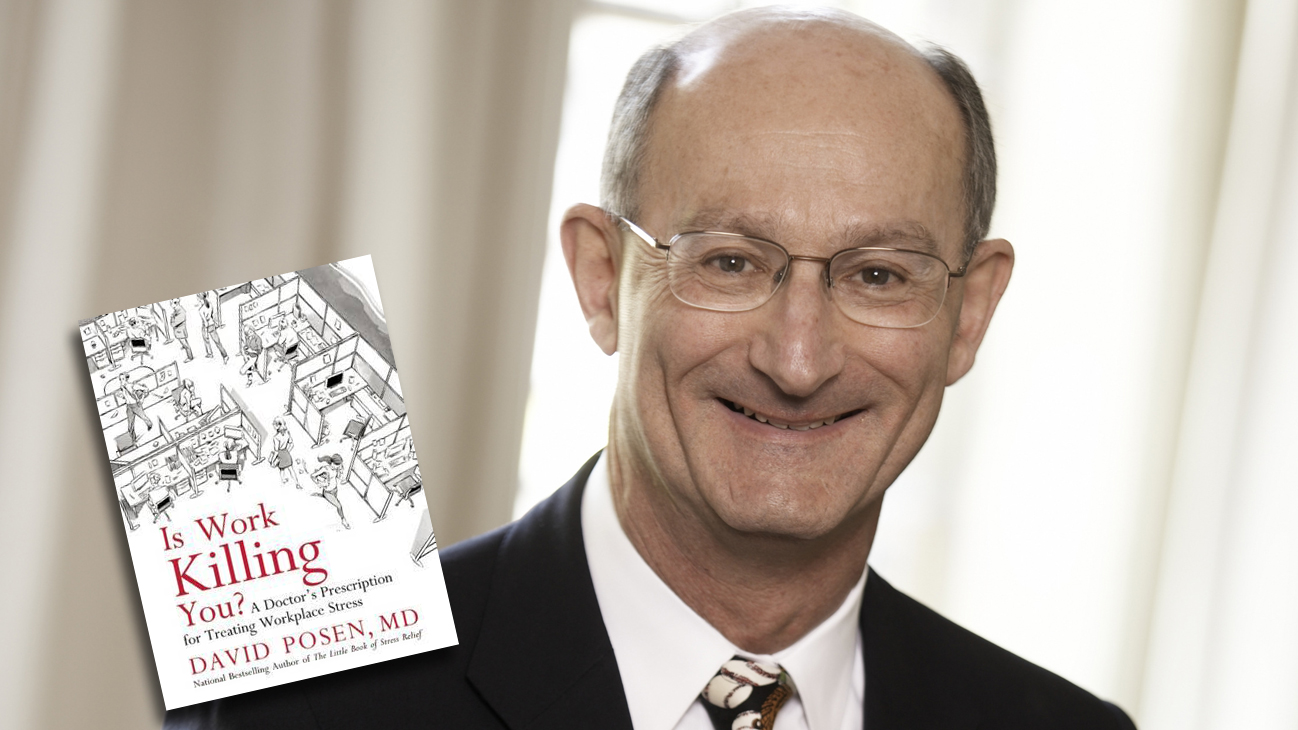Dr. David Posen asks a question on the minds of many in his recent book Is Work Killing You? A Doctor’s Prescription for Treating Workplace Stress. With USA Today, he talks about how the recent economic slump and culture of downsizing has created more employee stress amid fear of layoffs, increased workload and the 24/7 work environment:
Q: What is it about the work environment today that seems to make it so much more stressful than in the past?
A: A lot of people talk about the fact that work is killing them. I would say it’s killing their family life and their personal life. It’s killing their spirit, and in some cases, it’s causing very serious health problems. But the psychological effect of stress — after a while — is very damaging. They are not engaged and not enthusiastic. There’s kind of an underlying resentment. There’s a sullen compliance to the demands of work. They know they have to do it, but it’s a struggle just to be there and be present and be focused.
Q: You’ve written about stress at work before. Now, though, you blame the workplace. Why?
A: I don’t necessarily like the word “blame.” I want to hold the workplace accountable and responsible for a good part of the problem. Too much of the onus been put on the employees to deal with their stress themselves, and their work-life balance. I believe now that the workplace is shirking its responsibility and generating stress that even the most expert stress manager can’t dissipate. Downsizing is the biggest contributor to increased workload, which leads to longer hours. When researchers ask people why they’re not taking better care of themselves, the No. 1 answer is “I don’t have time.”
Q: You identify three big problems that contribute to burnout and low productivity. What are they?
A: The first is the volume of work — the workload itself — which I attribute to too few hands to share the load. The volume of work contributes to longer hours that affects home life and family life. The second problem is what I call velocity — the pace of the workplace. Everything has gotten faster, largely because of technology, and expectations have increased. The third aspect is abuse. There’s a pattern of being rude, embarrassing people in front of other people, of harassment, of bullying, of game-playing and head games. It can include sexism and racism and things like trying to steal credit for other people’s work. It can come from colleagues, bosses and even subordinates.
Q: As a physician, you have insight into the biology of stress as well as the psychological effects. Why have some workplace changes contributed to individual stress?
A: First, people are expected to multitask. Really, what we’re doing is switch tasking — toggling back and forth. But it’s also very stressful for the brain and raises cortisol (a hormone released in response to stress) levels, which have damaging effects for the whole body. Cortisol, when there’s too much, also affects memory. Another aspect is multiple and conflicting priorities. Deadlines are getting tighter. That’s tremendously stressful. People are being asked at job interviews if they’re good at multitasking. We have to stop thinking of it as a virtue, because when we try to multitask, we are inefficient and make more mistakes.
Q: What has technology done to our stress levels?
A: It has increased the speed of not only the workplace but life in general to a level that is uncomfortable for most people and not sustainable. It has contributed to off-hours work. It’s increased work hours. It has interfered with sleep. Reading on a tablet in bed — the light is coming at your eyes and it is biologically stimulating the brain to stay awake.
Q: So what can we do, other than quit our jobs?
A: I’m trying to raise awareness of this problem and make it OK to talk about it. Stress is affecting everybody, all the way up the hierarchy. It’s not just front-line workers. The second thing is to identify small things that can make a difference and can help. For example, taking breaks throughout the day. There should be a mid-morning break, a break at lunch, a mid-afternoon break and a break at supper. In other words, we need to pace ourselves. Every couple of hours, your energy and concentration start to flag anyway. Stress builds up and there’s no time to let it settle. Taking time-outs through the day is crucial and everybody needs to understand this. What individuals can also do is get the sleep they need. Not enough sleep makes us less resilient in dealing with stress and makes us less productive. Another one is, people need to get regular exercise, which they are not getting — even walking around the block or walking at lunch or going to the gym.

